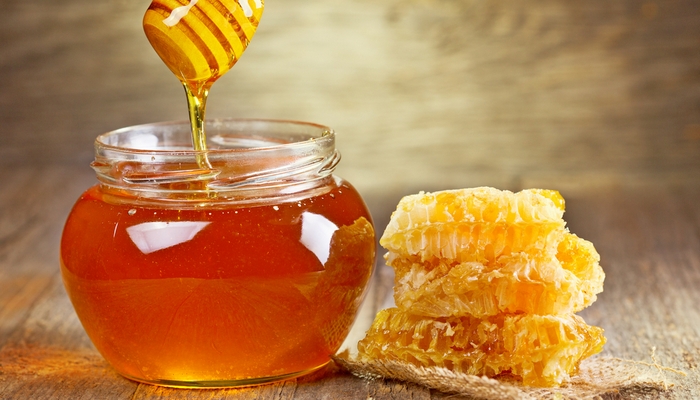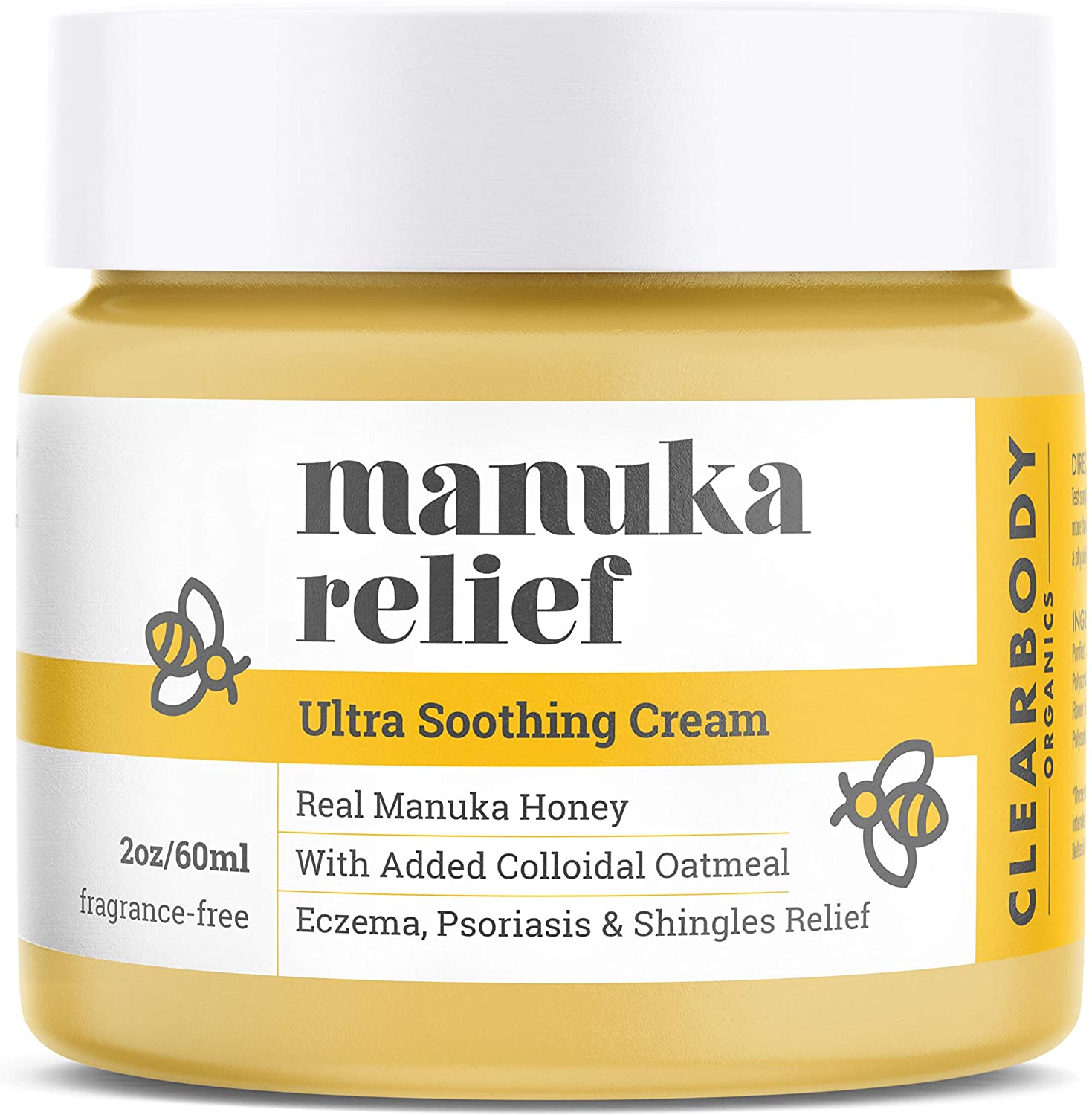
Table of Contents
There is a new buzz going around called Manuka Honey for Dogs. But as pet parents, we have the responsibility to make sure that what we're giving to them is completely safe.
We all want what's best for our dogs. We want the best food, best health, and overall their best life. So picking out the correct honey for dogs is somewhat crucial.
Honey can be a great addition to your dog's meal but of course only in small quantities. It is sweet, contains antioxidants, and gives the benefits of a few vitamins and minerals. Research has shown that honey has an inhibitory effect on about 60 species of bacteria.
A great example of this is Manuka Honey for kennel cough, but we'll discuss this and other manuka honey benefits for dogs later on.
What is Manuka Honey?
Manuka Honey, also known as “monofloral” honey meaning it is produced only from the nectar of the Manuka Tree.
These trees are originally found in New Zealand and Australia. But now, Manuka Trees are cultivated around the world to increase Manuka Honey production.
This honey has gained popularity because advocates say that it can treat wound infections and other ailments. Manuka honey contains the highest amount of antibacterial properties out of all kinds of honey.
If we compare Manuka Honey to regular honey, Manuka Honey has four times the nutrient content!
Manuka Honey Safety
In most cases, Manuka honey is safe for dogs. But not only they are safe, but dogs can also gain health benefits from them. With that being said, you should still be cautious and consult with your vet before giving them Manuka honey.
For instance, avoid giving Manuka honey to dogs under a year old. The same foes for obese or diabetic dogs.
Puppies are not allowed to eat honey, the same reason why babies should not be fed honey. Honey can contain Botulism Spores. These spores release a toxin that can poison infants and puppies because of their underdeveloped digestive systems.
On the other hand, the health risks of a diabetic or an obese dog can increase. It is because honey contains large amounts of concentrated sugar.
Honey Healing Properties
In recent studies, scientists have discovered that raw, unpasteurized honey is antibacterial, antifungal, and antiviral. The main reason why honey can do all these things is that it contains hydrogen peroxide which is a powerful antiseptic.
And as I stated above, not all honey is equal. Out of all of them, Manuka honey has the most beneficial characteristic. Manuka oil is known to help with relieving stress and other psychological problems in humans.
In addition, Manuka honey consists of powerful chemical components that can help protect our dogs from different infections or diseases. These chemical components are:
- Methylglyoxal (MGO) – MGO is Manuka's key healing chemical component which is naturally found inside. It is proven to be effective in dealing with harmful bacteria.
- Dihydroxyacetone (DHA)- DHA is found in the nectar of Manuka flowers. It is later converted into Methylglyoxal in the honey-making process.
- Leptosperin – Leptosperin is a natural chemical compound found in the nectar of Manuka plants.
Manuka Honey Can Help With Common Infections
- Escherichia coli – commonly known as E.coli, is a bacteria found in the lower intestine. It is usually benign, but it can also lead to a disease called colibacillosis or E.Coli Infection.
- Proteus mirabilis – it is a typical cause of upper and lower UTIs in dogs, also with otitis externa, and uncommonly pyoderma.
- Pseudomonas aeruginosa – is usually found in soil, water, and decaying organic water.
- Salmonella typhimurium – is an infection found in dogs caused by the Salmonella bacterium and it can also lead to disorders.

Manuka Honey for Dogs Benefits
Kennel Cough
Kennel cough for dogs is much more common than it is for cats. Manuka Honey's antibacterial effectiveness can be an effective treatment for this.
The MGO present in this honey is the key chemical component that has been proven to be effective in defeating harmful bacteria. Bordetella is the major bacteria causing Kennel Cough.
In addition, Manuka honey also can reduce inflammation and swelling. This can help soothe your dog's throat and reduce the pain they're feeling while coughing.
Helps to Heal Wounds
On some occasions, your dog can get hurt and can get cuts or bruises from time to time. But don't you worry that much! If you've got honey, you'll be alright.
Manuka honey is known to help heal dog wounds. But first, you need to clean the wound. After that, you can apply pure Manuka Honey directly to the open wound. Then you can let it dry out and put the bandage over it.
As we discussed earlier, the Methylglyoxal or MGO in the Manuka Honey helps protect the wound from getting any other kind of infections.
Reduces Skin Problems
Dogs are also prone to skin diseases or skin irritations caused by bacteria or yeast problems. Luckily for you, Manuka honey can fight both of these.
Another cause of skin problems in dogs is allergies. Manuka honey can help as an itch relief while you're sorting out the medication needed for the allergy.
Skin problems often lead to inflamed skin. As we all know by now, Manuka Honey is very effective at controlling inflammation.
You can use Manuka honey as a treatment topically. For instance, try Eczema Psoriasis Cream. Made from pure, organic medical-grade Manuka Honey for skin irritations.
See Amazon Pricing HERE
In addition, there are now shampoo products that are made with Manuka Honey. But if you already bought one, you can add a tablespoon or two to your dog's shampoo on their next bath time.
But if you're looking for a less sticky alternative, try to give it to your dog orally.
Improve Oral Health
As much as we love getting kisses from our dogs, their breaths don't exactly have a pleasant smell.
Your dog's stinky breath can be caused by a few things. A few examples of these are dental diseases, allergy symptoms, diarrhea, and vomiting.
Let's take in dental disease. The first stage of this disease is Gingivitis. It is where the bacteria below the gum line is inflamed. This is where Manuka honey comes in handy.
Manuka Honey is so effective that it can even fight off oral bacteria!
Boosting Immune System and Supporting Gut Health
70-80% of immune cells are present in the Gut. Manuka Honey can not just help your dog's gut health, but it can effectively boost your pup's immune system.
That means you need to ensure that your dog's digestive system has a good balance of bacteria. Manuka honey comes into play since it is a natural Prebiotic.
So you've heard of Probiotics? No? Well, Probiotics are the good bacteria that are essential to your dog. And Prebiotics fuel these probiotics and help them succeed.
How Much Manuka Honey To Feed Your Dog
If you're going to give your feed your dog Manuka Honey and not use it topically, you should know that there is proper dosage for this.
As the dog owner, you have this responsibility. Make sure that you're not giving them inadequately and of course, not excessively.
You can not just give them what you think you know what's best. Start slow and gradually increase it from time to time.
For starters, try 1/2 tablespoon twice a day for dogs under 20lbs. For medium dogs weighing 20-60lbs, try 1 tablespoon twice a day. And lastly, try 2 tablespoons twice a day for large dogs weighing 60lbs+.

Frequently Asked Questions
What other pets can benefit from Manuka Honey?
Manuka Honey can help a lot of other pets. With different species, studies show that they can gain different health benefits from this honey.
Below is a shortlist of different pets that can benefit from Manuka Honey:
- Cats
- Mice or Rats
- Ferrets
- Birds
- Horses
- Turtles
- Lizards
What are other natural antibiotics that are safe for dogs?
Since the beginning of time, humans have found that a lot of medicinal properties of chemicals can be found in nature. And these substances can now be found in your backyard.
You can find potent antibiotic properties in an average garden. These are great alternatives for an untimed bacterial infection.
Before I list out the other natural antibiotic alternatives, always remember that you should always consult with your vet first before jumping the gun.
- Oil of Oregano
- Olive Leaf
- Essential Oils (Oregano, Clove Bud, Cinnamon Bark)
- Garlic ( but with caution)
- Plantain
- Goldenseal
- Yarrow
- Calendula
- Turmeric
Can dogs eat raw honey?
Yes, it is perfectly safe to feed your dogs honey. It can be with a stick, local honey, or of course, Manuka Honey. If you're having a hard time choosing, I suggest that you go for Manuka Honey. It will give your dog the most nutritional benefits out of all of them.
However, try to avoid honey from the supermarket. These are processed honey that is made from low-quality ingredients.
And as I stated above, there are still dogs that can't eat honey. Honey is unsafe for puppies, diabetic, and obese dogs.

Manuka Honey For Dogs Final Thoughts
Manuka honey for dogs is slowly making its mark on the pet world and with good reasons. This honey is known to have many healing properties.
Manuka honey is known to help heal wounds. It can also fight off other infections with its antibacterial properties.
With these antibacterial properties, Manuka honey can also help with Kennel Cough. It is proven to be strongly effective against harmful bacteria.
Since gaining popularity, there are now Manuka honey-made creams and shampoo for dogs to help with skin irritations. A skin disease that is caused by bacteria, yeast, and even allergy can benefit greatly from this.
In addition, Manuka honey can also act as prebiotic support for a healthy gut. And with a healthy gut, you can easily boost your dog's immune system.
A healthy immune system is crucial to a dog. The immune system will determine their survival. If their immune system is weak, they can easily catch different kinds of diseases.
This honey is so good that it can even help with a dog's oral health. It can work wonders for a dog with bad breath.
However, it is still best advised to consult with your vet or a proper veterinary nutritionist when it comes to new food. Ask them about manuka honey's benefits for dogs.
READ NEXT: 17 HERBAL REMEDIES FOR DOGS














